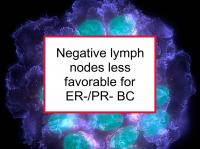Breast cancer is considered lymph node negative if no metastases are found in axillary lymph nodes. Generally speaking, lymph node negative early stage breast cancer has a very favorable prognosis, with five-year survival rates of over 97% for women treated with lumpectomy plus radiotherapy.
However, not all women with negative lymph nodes avoid a relapse. Now a new study has identified factors associated with locoregional recurrence (recurrence in the breast, chest wall, or lymph nodes) in such women.
The ACOSOG Z0010 Trial
To conduct the study, the authors used data from ACOSOG Z0010, a prospective trial started in 1999 by the American College of Surgeons Oncology Group. The trial was designed to examine occult sentinel lymph node metastases and occult disease in bone marrow of women with earlystage breast cancer. Occult metastases (which normally are tiny) are those not detectable during routine examination and pathology. The trial included women with early stage T1-2 (less than 5 cm) breast cancer with clinically negative lymph nodes (i.e., not detectable by hand) who were treated with lumpectomy and whole breast radiation.
All of the women underwent sentinel lymph node dissection (in which the first lymph node or nodes to which cancer is likely to spread from the primary tumor are removed for biopsy). Systemic therapy was administered as appropriate.
Lymph node status and outcomes of trial participants
A total of 3,904 (76%) of the 5,119 participants had negative sentinel lymph nodes. The women had a median age of 57 years (range: 23 to 95) and were followed for a median of 8.4 years. There were 127 local (in the breast), 20 regional (chest wall or lymph nodes), and 134 distant recurrences during follow up.
Hormone receptor status, tumor size and age influence prognosis
The authors conducted analyses to determine the factors associated with local or regional (locoregional) recurrence in women with lymph node negative breast cancer. Locoregional recurrence was most strongly associated with hormone receptor negative (ER-/PR-) tumors and younger age. On the other hand, hormone receptor positive tumors and treatment with chemotherapy were associated with a reduction in locoregional recurrence. When local recurrence was analyzed over time, reduced overall survival was found to be associated with older age (increasing time), T2 disease (between 2 cm and 5 cm), and high tumor grade.
Local recurrence was also found to be associated with reduced overall survival over time. This is consistent with previous reports that locoregional recurrence increases the risk of subsequent breast cancer events and death, particularly in patients with ER-/PR- disease. The authors conclude that locoregional recurrences are rare in early stage breast cancer patients with negative sentinel lymph nodes. Younger age and ER-/PR- disease are associated with higher relapse rates, and local recurrence is associated with lower overall survival.
Please see our articles on the prognosis of triple negative, ER+/PR+, and HER2+ breast cancer prognosis for more information on factors influencing breast cancer outcomes.
